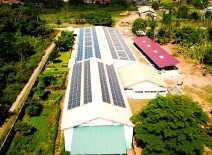ETI exists to address human rights impacts in global supply chains. Historically human rights and environmental issues, including climate change, have been treated as separate issues. However, a growing body of evidence demonstrates that environmental degradation and climate change have impacts on human rights, including on the human rights of workers. Just transition brings these two sets of priorities together.
Just transition focuses on how to green our economies in ways that ensure decent work and inclusive economic development. It puts human rights and social dialogue between employers and workers at the centre of environmental action.
As the links between climate crisis, environmental degradation and human rights risks for workers become increasingly evident and pressing, it is imperative that ETI supports its company members to integrate this focus into responsible business practice.
ETI’s approach
Calls for a just transition first emerged from trade unions in the 1980s. It gained prominence in 2015 through inclusion in the preamble to the Paris climate change agreement. Despite this longevity and prominence, just transition is not a widely used term within industry and businesses beyond the energy sector. And at the same time, often the discourse around just transition can seem very high level – for example, aiming to influencing national industrial strategy. Specific guidance on what just transition means for individual companies – what they should do and not do – is not yet commonplace, especially for companies outside of the energy sector.
ETI aims to address these gaps.
Within our work on just transition we aim to:
- Focus on sectors that are major contributors to global greenhouse gas emissions and that are highly vulnerable to climatic impacts, but which to date have not received a lot of attention with respect to just transition. These include Apparel and Textiles, Food Farming and Fisheries, and General Merchandise.
- Co-develop joint member guidance on actions that individual companies can and should take to integrate just transition into responsible business practice.
- Promote and uphold social dialogue as central to just transition, drawing on the expertise and authority of our trade union and NGO caucuses.
- Ensure an intersectional gender perspective throughout, including an intentional focus on at risk workers including women workers, informal workers and migrant workers.
- Balancing a focus on the existing but growing impacts of the climate crisis on the human rights of workers, with a focus on how to support human rights due diligence within emerging transition activities.
Flooding: Risks and impacts for workers in global supply chains

can address these risks as part of a broader HRDD approach.
Extreme Heat: Risks for workers in global supply chains
How can brands and suppliers protect garment workers from the risks of extreme heat?

Just transition at ETI




